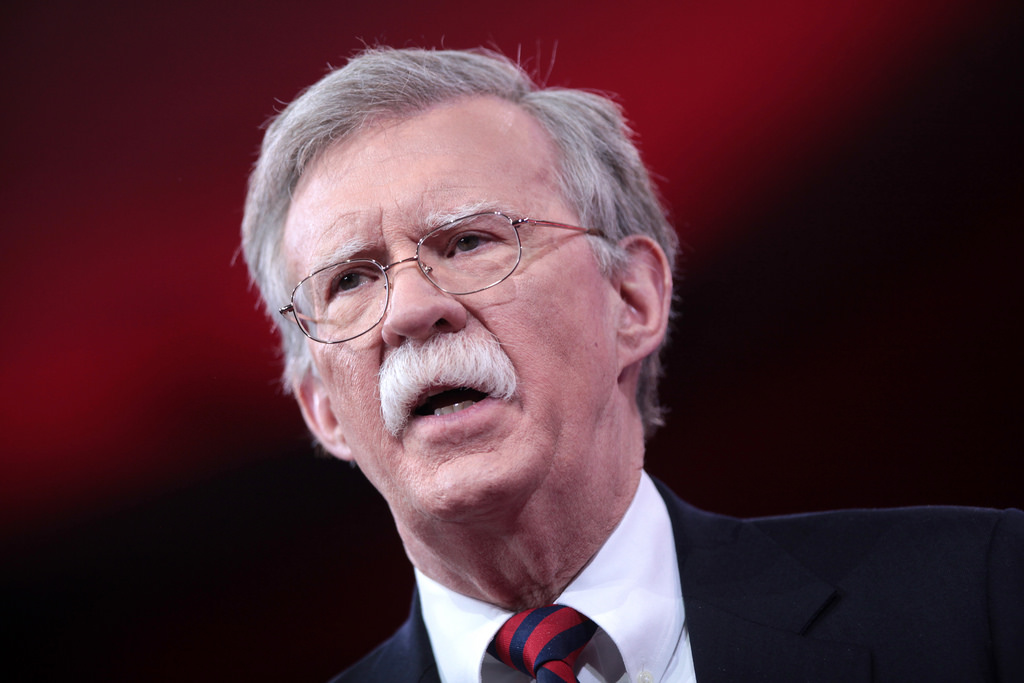Donald Trump and John Bolton: A Volatile Mix
President Trump and his incoming national security adviser, John Bolton, make for an interesting and volatile mix of ideology, temperament, and ability. Unlike some Lawfare contributors, we don’t know Bolton, but we have reviewed many of his public writings and statements. Based in part on our own experience in government, including at the National Security Council, here is how we think about his upcoming tenure and the issues likely to arise after he takes office.

Published by The Lawfare Institute
in Cooperation With

President Trump and his incoming national security adviser, John Bolton, make for an interesting and volatile mix of ideology, temperament, and ability. Unlike some Lawfare contributors, we don’t know Bolton, but we have reviewed many of his public writings and statements. Based in part on our own experience in government, including at the National Security Council, here is how we think about his upcoming tenure and the issues likely to arise after he takes office.
Bolton is politically ideological in the traditional sense. He is a rock-ribbed, super-hawk Republican and has been since he volunteered for Barry Goldwater more than 50 years ago. As far as the public record shows, he has never wavered. The title of his book, published in 2007, is “Surrender is Not an Option.”
Trump, by contrast, does not seem to be driven by deeply held ideological commitments, although he is the de facto leader of the Republican Party and has hitched his political life to its right-wing base. To us, at least, Trump seems more focused on a platform of “winning” and being “great”—which his critics, at least, equate with narcissistic self-promotion.
But much of Bolton’s long-term political ideology fits nicely with Trump’s current desires. Bolton is a strong proponent of executive power, privilege and secrecy. He has, for example, expressed sympathy and support for Robert Bork, the Justice Department official (and later, Supreme Court nominee) who fired Watergate Special Prosecutor Archibald Cox as directed by President Nixon after the attorney general and deputy attorney general both refused to do so. That may endear Bolton to Trump in connection with the ongoing investigation by Special Counsel Robert Mueller. Bolton has also referred to federal campaign finance laws as an “overreact[ion]” to Watergate, and fought against them as counsel for the petitioners in Buckley v. Valeo.
Bolton is a graduate of Yale’s college and law school, but he is deeply mistrustful of the “Eastern Establishment” and the mainstream media. In his book, he criticized the “permanent bureaucracy” and its capacity to thwart a president’s will long before it became fashionable to attack what has since become known in some quarters as the Deep State.
He is very skeptical of international law and institutions, especially insofar as they constrain national sovereignty. In 2000, he wrote an article questioning whether international law is really law at all. Trump likewise is no fan of such constraints or institutions, expressing (at various times and to various degrees) criticism of NATO and the United Nations. Many more moderate scholars and officials have questions about international law and institutions, but Bolton’s views are at the far edge of the spectrum, and like his boss he has expressed them quite colorfully: He has commented that if the 38-story U.N. building “lost ten stories, it wouldn't make a bit of difference.”
Bolton also is, of course, famously hawkish on foreign policy. He has advocated military strikes on Iran and, if China cannot contain Kim Jong-un and ultimately unify the peninsula, a major attack on North Korea.
Looking ahead, we think there are at least three groups of questions about Bolton’s service under Trump. First, there may appear to be agreement between them on certain matters—but is there really? The main issue here is whether President Trump really wants to attack Iran or North Korea, or merely prefers tough talk in hopes of securing a “better deal.” Put differently, is his selection of Bolton more of a signal or negotiating tactic than a genuine prelude to war? If so, is Bolton in on this strategy, or does he really believe that war is the answer? As Bolton transitions from Fox News to the White House Situation Room, will sharing responsibility for the safety and security of the American people have a moderating effect? And if the president and Bolton do decide to attack Iran or North Korea, will they do so in conformity with the laws of the United States and the law of armed conflict?
Second, where they disagree, how will Trump and Bolton resolve their differences? The leading question here concerns Russia. The president, of course, has been mysteriously charitable towards Vladimir Putin, leading some to speculate that he may somehow be compromised. Bolton, by contrast, has long expressed concern about post-Soviet Russia’s desire for a return to great-power status. To be sure, he recorded a strange video addressing the Russian people in 2013 and extolling the virtues of private gun ownership, but in general, he has described Putin’s Russia as a strategic competitor and adversary.
Given their similar temperaments, disagreements between the president and Bolton might become heated. Bolton seems to believe that tough talk reflects clear thinking. He disdains the muddled nuance of traditional carrot-and-stick diplomacy in favor of audacity and attack—both in international relations and, it is said, in the workplace. He is also very comfortable in the spotlight. Trump does not seem to have much tolerance for subordinates who speak to him strongly or attract too much attention, as Steve Bannon and Anthony Scaramucci could probably attest. Secretary of State Rex Tillerson may have had to eat his salad before being fired; will John Bolton shave if the president objects further to his mustache?
Third and finally, what will be the primary impact of Bolton’s undeniable expertise and skill in managing the federal bureaucracy? Judged by historical standards, the Trump White House seems very weak. It tends to focus heavily on issues within the president’s personal field of view (whether that field of view is defined by television or otherwise). And it is riven by unusually severe internal strife and turnover that handicaps both policy development and execution.
Some critics of the Trump administration refer to the current state of affairs as malevolence tempered by incompetence. What will happen if the assessment changes to malevolence enabled by ability? Put in more neutral terms, will Trump understand and appreciate it if Bolton tries to play Dick Cheney to his George W. Bush? And how will Vice President Mike Pence react to that? Defense Secretary Jim Mattis apparently treated Bolton’s predecessor, H.R. McMaster, as a subordinate, rather than as a peer; such an approach is likely to provoke a robust response from Bolton. But what will happen if Bolton and Mattis fall into conflict? And what if effective management is simply impossible in this administration because the president is too mercurial? How many times will Bolton have the rug pulled out from under him before he loses credibility or gives up in frustration?
For now, despite good reason to fear the worst, these questions may not be answerable. But two things do seem certain—both written by Bolton in “Surrender is Not an Option.” First: “[W]hen a new boss comes into a bureaucracy, one should not expect existing working relationships to continue.” In an administration that has demonstrated its willingness to demand loyalty and purge dissenters at various levels, this should be a concern for White House, NSC, and agency personnel. Second: “I conclude from my experience that incremental efforts at reform are inherently incapable of producing significant and lasting change.” Given the importance of Bolton’s new job and the inexperience and instincts of his boss when it comes to national security matters, this should be a concern for all of us.






